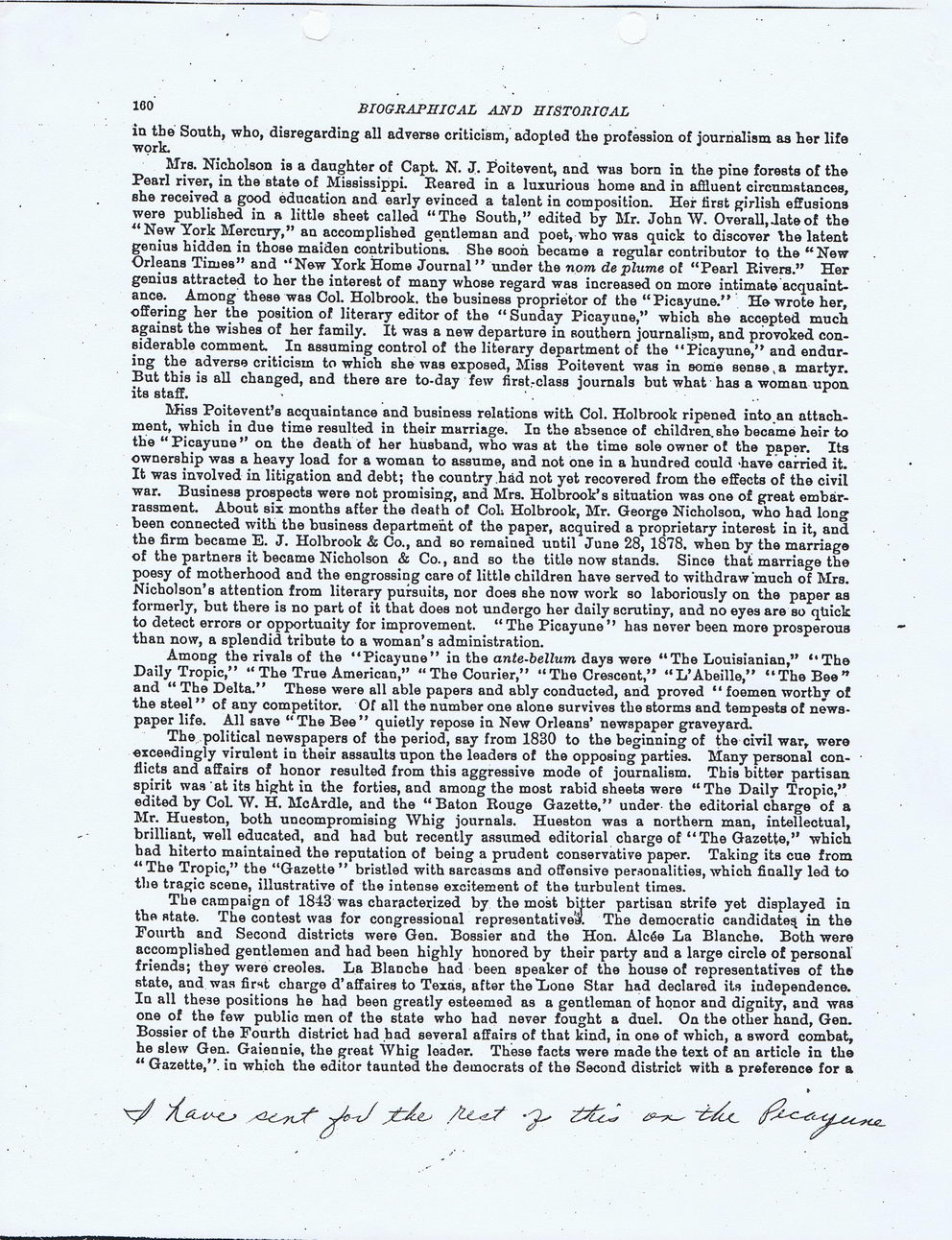This text was obtained via automated optical character recognition.
It has not been edited and may therefore contain several errors.
160 BIOGRAPHICAL AND HISTORICAL in the South, who, disregarding all adverse criticism, adopted the profession of journalism as her life work. Mrs. Nicholson is a daughter of Capt. N. J. Poitevent, and was born in the pine forests of the Pearl river, in the state of Mississippi. Reared in a luxurious home and in affluent circumstances, she received a good education and early evinced a talent in composition. Her first girlish effusions were published in a little sheet called ?The South,? edited by Mr. John W. Overall,Jateof the ??New York Mercury,? an accomplished gentleman and poet, who was quick to discover the latent genius hidden in those maiden contributions. She soon became a regular contributor to tlie ?New Orleans Times? and ??New York Home Journal ? under the nom deplume of ?Pearl Rivers.? Her genius attracted to her the interest of many whose regard was increased on more intimate acquaintance. Among these was Col. Holbrook, the business proprietor of the ?Picayune.? He wrote her, offering her the position of literary editor of the ? Sunday Picayune,? which she accepted much against the wishes of her family. It was a new departure in southern journalism, and provoked considerable comment. In assuming control of the literary department of the ?Picayune,? and enduring the adverse criticism to which she was exposed, Miss Poitevent was in some sense,a martyr. But this is all changed, and there are to-day few first-class journals but what has a woman upon its staff. Miss Poitevent?s acquaintance and business relations with Col. Holbrook ripened into an attachment, which in due time resulted in their marriage. In the absence of children.she became heir to the ?Picayune? on the death of her husband, who was at the time sole owner of the paper. Its ownership was a heavy load for a woman to assume, and not one in a hundred could >have carried it. It was involved in litigation and debt; the country .had not yet recovered from the effects of the civil war. Business prospects were not promising, and Mrs. Holbrook?s situation was one of great embarrassment. About six months after the death of CoL Holbrook, Mr. George Nicholson, who had long been connected with the business department of the paper, acquired a proprietary interest in it, and the firm became E. J. Holbrook & Co., and so remained until June 28, 1878. when by the marriage of the partners it became Nicholson & Co., and so the title now stands. Since that marriage the poesy of motherhood and the engrossing care of little children have served to withdraw'much of Mrs. Nicholson?s attention from literary pursuits, nor does she now work so laboriously on the paper as formerly, but there is no part of it that does not undergo her daily scrutiny, and no eyes are so qtiick to detect errors or opportunity for improvement. ?The Picayune? has never been more prosperous than now, a splendid tribute to a woman?s administration. Among the rivals of the ?Picayune? in the ante-bellum days were ?The Louisianian,? ?The Daily Tropic,? ? The True American,? ? The Courier,? ?The Crescent,? ?L?Abeille,? ?The Bee? and ? The Delta.? These were all able papers and ably conducted, and proved ? foemen worthy of the steel ? of any competitor. Of all the number one alone survives the storms and tempests of newspaper life. All save ?The Bee? quietly repose in New Orleans? newspaper graveyard. The political newspapers of the period, say from 1830 to the beginning of the civil warr were exceedingly virulent in their assaults upon the leaders of the opposing parties. Many personal conflicts and affairs of honor resulted from this aggressive mode of journalism. This bitter partisan spirit was at its hight in the forties, and among the most rabid sheets were ?The Daily Tropic,? edited by CoL W. H. McArdle, and the ?Baton Rouge Gazette,? under the editorial charge of a Mr. Hueston, both uncompromising Whig journals. Hueston was a northern man, intellectual, brilliant, well educated, and had but recently assumed editorial charge of ? The Gazette,? which bad hiterto maintained the reputation of being a prudent conservative paper. Taking its cue from ? The Tropic,? the ?Gazette ? bristled with sarcasms and offensive personalities, which finally led to the tragic scene, illustrative of the intense excitement of the turbulent times. The campaign of 1843 was characterized by the most bitter partisan strife yet displayed in the state. The contest was for congressional representative* The democratic candidate^ in the Fourth and Second districts were Gen. Bossier and the Hon. Alc6e La Blanche. Both were accomplished gentlemen and had been highly honored by their party and a large circle of personal friends; they were creoles. La Blanche had been speaker of the house of representatives of the state, and was first charge d?affaires to Texas, after theXione Star had declared its independence. In all these positions he had been greatly esteemed as a gentleman of honor and dignity, and was one of the few public men of the state who had never fought a duel. On the other hand, Gen. Bossier of the Fourth district had had several affairs of that kind, in one of which, a sword combat, he slew Gen. Gaiennie, the great Whig loader. These facts were made the text of an article in the ? Gazette,?, in which the editor taunted the democrats of the Second district with a preference for a

Pearl Rivers Mrs. Nicholson Biographical and Historical